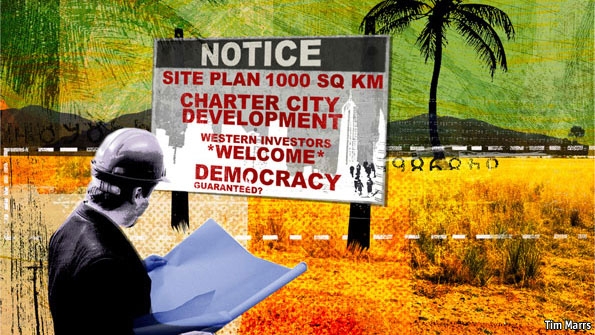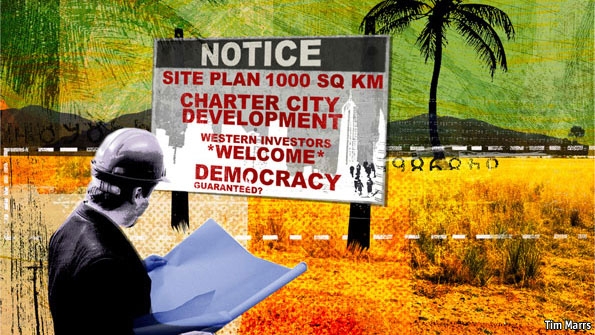Romer’s concept starts through a modest realization: in many places, especially in developing countries, weak or outdated rules hold people back; given national borders and migration restrictions poor people in developing countries have the ability to vote with their feet only within their national borders and therefore are unable to escape the trap of established rules. Romer proposes the creation of urban enclaves with new, radically different rules within such national contexts. Under his view and based on the idea of meta-rules (rules about rules), one can develop a new set of rules on a specific geographic location. People will have the free choice to opt in or out of the new set of rules.
While the concept above might seem abstract and vague, Romer decided to implement his thought through the creation of a charter city, a city built from scratch, based on a specific charter-set of rules, allowing free choice for people to opt in and out. Even if Romer’s idea may sound revolutionary, in practice the NYU economist does not propose anything radically different than Hong Kong or the development of Shenzhen in China. The first charter city experiment started in Honduras. The president of the country and its Congress passed a law at the beginning of 2011 to start the process. A site was selected and the charter was developed; what initially sounded like a sci-fi urbanization scenario - especially in the Honduran context, one of the least developed and most violent countries of Central America – seemed feasible and clearly underway. But one year later, Romer decided to abandon his own project, once he found out that the Honduran agency set up to oversee the project had signed a memorandum of understanding with its first investor group, without consulting the temporary transparency commission that Romer had established.
One could argue that Romer was a victim of his own idealism or naiveté. Expecting transparency in the highly corrupted environment of Honduran politics is somewhat unrealistic. But considering that Romer omitted this important considerations (political environment, corruption etc.) would be equally, very unlikely. Perhaps the failure of establishing a charter city stumbled on the nature and theoretical basis of Romer’s concept, the notion of rules. In that sense, as argued by Malkin, an internal contradiction in the theory is playing out: To set up a new city with clear new rules, you must first deal with governments that are trapped in the old ones.[1] How reasonable is to consider that the establishment and elaboration of such rules would be performed in isolation to the current policy and political environment?
The charter cities example poses very interesting questions in terms of policy analysis. It showcases the path-dependent nature of policy decisions, the difficulty of establishing punctuation and policy change but perhaps more importantly, the need to elaborate and think of policy actions within an institutional framework. In that sense, Ostrom’s framework of institutional rational choice provides a useful spectrum in understanding the charter city case. Ostrom underlines that “Rules are shared understandings among those involved that refer to enforced prescriptions about what actions (or states of the world) are required, prohibited, or permitted.” At the difference of Romer she does not establish a value judgment on the quality of rules (good vs. bad). On the contrary, Ostrom pays particular attention to the origins of these rules. She notes “With governance, one needs to ask where the rules that individuals use in action situations originate.” Perhaps this is the question that Romer forgot to ask. Where the rules originate is perhaps as important as who or which institution establishes the rules. And in the case of charter cities the rules originate through external institutions, disconnected to the reality of the Honduran people, the people who are expected to opt in. Shouldn’t these rules be based on a set of norms established within the Honduran society?
It seems that the failure of the first charter city experiment relies on the false belief that an institutional framework, a set of rules, is some sort of a deus-ex-machina that establishes the necessary change out of nowhere. Unless this structural issue is not addressed, I believe that future attempts to establish charter cities will equally fail. For a framework to be successful, it needs to be established upon rules that are generally accepted, respecting societal norms and other attributes of each society. Romer’s charter city concept relies on the free choice of people to opt in or out of the new rules established; shouldn’t these rules be elaborated and established by the people who later on will decide to either opt in or out?
Achilles
[1] Retrieved from http://www.nytimes.com/2012/10/01/world/americas/charter-city-plan-to-fight-honduras-poverty-loses-initiator.html?_r=0, accessed on March 11th, 2013.
Comment: Achilles, in your last 2 paragraphs you've asked the same question twice though in the first instance it was focused on the Honduran people and in second it is generalized. I believe that the initial establishment of new rules in the case of charter cities should not include the people who are expected to opt in or out. I think what is instrumental to the success of the charter experiment is the isolation of the city from the rest of the society and similarly the initial formulation of the new rules should also be undertaken in isolation from the already established social rules and norms. The potential lesson to be learned from the Honduran example you discussed is the potential negative impact of the influence of already established norms of behavior. The Honduran officials were merely acting in a way that is "normal" to their current state of the world and they were able to do that because nothing was established formally (stated) and informally (accepted) to prevent them from doing so. so they reverted to the generally accepted behavior. The experiment failed because necessary rules were not put in place...which may have been a planning oversight...not idealism of naivete
Deon


 RSS Feed
RSS Feed